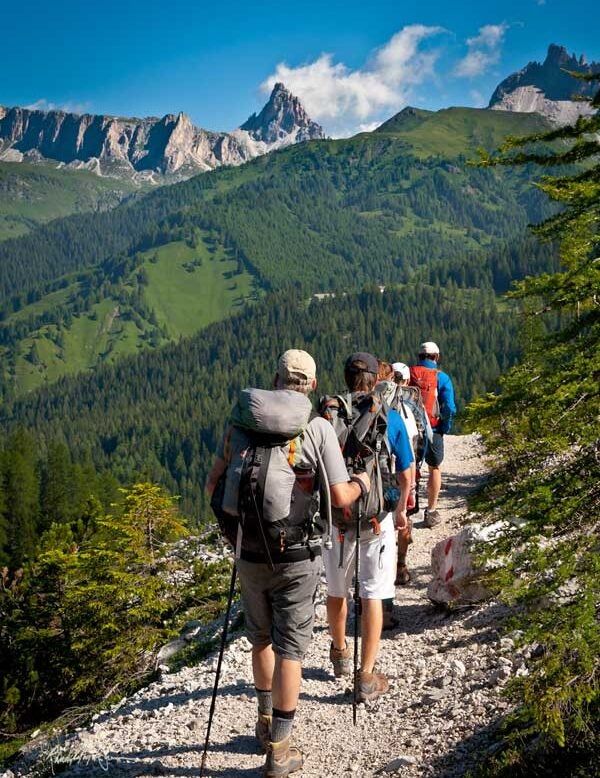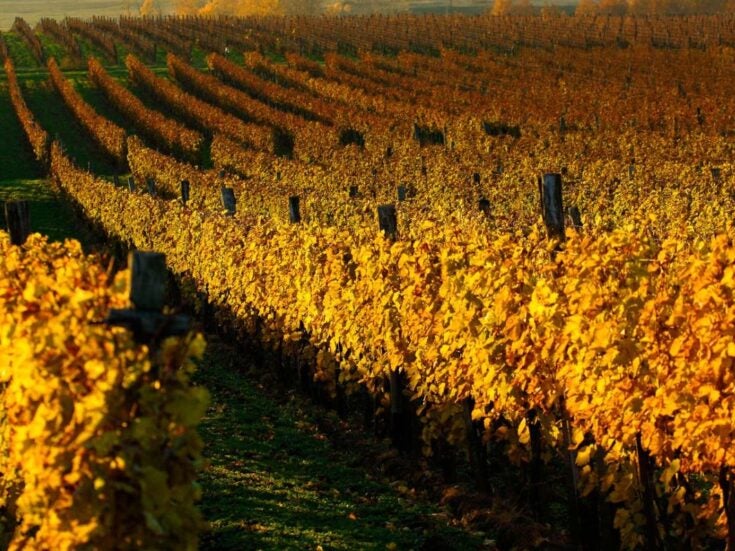
The Dolomites are rich in history, hikes and fine dining, writes Jason Cowley, editor of the New Statesman
One morning during our stay in the South Tyrol, we went hiking in the Dolomites with Diego Zanesco. He is a renowned climber and guide and an associate of Reinhold Messner, the region’s most celebrated alpinist. Our schedule was far from demanding — our seven-year-old son was among the party — and after a couple of hours of leisurely walking we stopped for lunch at one of the mountain huts owned by Rosa Alpina, the hotel and spa where we were staying. There was no electricity in the hut, so lunch — which included tasting the local hard bread, Schüttelbrot — was prepared on a barbecue.
It was high summer but a cool day. As we had our lunch, storm clouds gathered and swirled, obscuring the surrounding pale-pink mountain peaks (which were once coral reefs on the sea floor). The previous afternoon, high in the mountains, we had been caught in a ferocious storm. This time, the clouds threatened, but rain did not fall. So, after lunch, instead of taking a cable car, we made our way down the mountain, often hurrying on tiptoe in imitation of Diego (who did not so much walk as sprint along the rugged track ahead of us), and back to Rosa Alpina for an afternoon swim.
Diego is much in demand. In winter, he is the ski guide of choice for any number of VIPs, from the Murdoch media family to various presidents and prime ministers. The mountains were, he told us, ‘like a pharmacy’. He picked wild flowers and herbs — arnica, spinach, clover, chicory, cumin, hogweed, garlic mustard, daisy, silverweed, bistort — and discussed their various medicinal uses and properties. He told us with pride of how the Dolomites were declared a Unesco World Heritage Site in 2009 and about the English adventurers who made field trips here in the 1860s and did so much to popularise the region with travellers.
We were staying in the village of San Cassiano in Badia, which is in Italy, of course, but is actually a Ladin village. The Ladins are an ancient mountain people who have their own neo-Latin language (sometimes called Rhaeto-Romance) and culture. There are perhaps no more than 20,000 of them, mostly clustered in villages in the Dolomitic valleys and south-eastern Switzerland, but they are resolute defenders of their identity and cultural distinctiveness. There is a small state primary school in San Cassiano, where the children are taught in Ladin while also learning Italian, German, French and English. My son, at his very good school, will not begin to learn a second language until he is nine — and we wonder why the English are such resolute monoglots.
One of the fascinations of the South Tyrol is that it is one of Europe’s contested borderlands, where some of the great battles of history have been fought, cultures merge and the people are multilingual and have compound identities. The region has considerable autonomy within the Italian state and retains 90 per cent of its tax revenue, useful for one of the Europe’s wealthiest regions. The road signs are in Italian and German, and sometimes in Ladin as well. German is the mother tongue of an estimated 69 per cent of the local population.
The South Tyrol was part of the Habsburg Empire until the region was annexed by Italy in 1919, in the aftermath of World War I. The new frontier was the Brenner Pass. During the war there was prolonged fighting between the Italian and Austro-Hungarian armies in the high Tyrolean mountain passes, and many troops froze to death in the long winters.
Over the decades, there have been various attempts, notably by Mussolini and the Fascists, to ‘Italianise’ the South Tyrol by, for example, banning German from being taught in schools and resettling large numbers of southern Italians in the north-east. Even today there is a separatist movement that aspires to reunite the German speakers of the South Tyrol with the North Tyroleans in Austria.
Rosa Alpina has been owned by three generations of the same Ladin family, the Pizzanis. The present owner is Hugo Pizzani. I’d met him before at a party in London, and when we arrived he greeted us warmly, his young daughter in his arms. Rosa Alpina offers immaculate and sophisticated service, as one would expect of a member of the Relais & Châteaux group, but it is never stuffy or precious. Children are not merely welcome but joyfully embraced, and there is a children’s playroom in the hotel and a playground nearby in the village. My only grumble was that our bed was too hard.
The buffet breakfast is served in an elegant wood-panelled room, with its own outside terrace. This is a separate room from the main Restaurant Wine Bar & Grill, which at lunchtime and in the evening serves fresh fish, pasta and pizza and has an excellent wine list, offering any number of local Italian and Austrian wines by the glass.
For fine dining there is yet another restaurant, the two-Michelin-starred St Hubertus, one of the most renowned in the north of Italy. The head chef, Norbert Niederkofler, has been in place since it opened in 1996. He and Hugo travel widely, visiting different countries for inspiration and to experiment with new techniques as they plot their way to that third Michelin star.
We dined at the chef’s table in the vast and burnished stainless-steel kitchen of St Hubertus — there are nine tables in the intimate dining room. Once again, our son Edward was welcome, and the atmosphere was calm rather than frenetic, as can sometimes be the case even in the best-run kitchens. We had the tasting menu (Edward had his own bespoke options), which included Norbert’s signature dish — beetroot gnocchi with horseradish. It sounds routine, but it was extraordinarily delicate and colourful, as well as rich in flavour.
Other diners joined us for an aperitif in the kitchen, and the mood was relaxed and informal, like the rest of the hotel, but the delicacy and precision of the cooking and overall attention to detail were just so — an appealing South Tyrolean combination of German competence and Italian flair. Norbert told us that he uses only ‘ingredients and produce from the mountains’ (his motto is, ‘I cook the mountains’), which means rapeseed rather than olive oil and freshwater rather than saltwater fish. Meat is bought on the Austrian side of the border, ‘because it is superior there’, and both he and Hugo have worked assiduously to find the best and most ethical suppliers.
Rosa Alpina is especially popular in winter during the skiing season. At dinner one evening we sat next to a Danish family who happened to live not far from us in England. This was their second visit to the hotel; they had spent the previous Christmas there and had been enchanted.
The local area, known as Dolomiti Superski, consists of twelve valleys and 1,223 kilometres (760 miles) of ski runs, one of which is the famous Val Gardena, venue for World Cup downhill races. We visited in summer but would love to return in winter. Hugo describes the region as offering the ‘best family skiing in Europe’, and who would contradict this proud Ladin, whose extended family has helped transform what was not so long ago a remote and impoverished mountain village into a thriving tourist destination combining the best of Italy and Austria.
‘This was a very poor area,’ Hugo told me one evening over a glass of Champagne. ‘We were looked down on. When our family took over the hotel, there was nothing here — certainly no ski lifts or tourist attractions. But things developed very quickly. Now look at the village and what we can offer!’
Jason Cowley is the editor of the New Statesman
www.rosalpina.it






